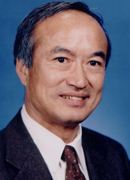
| Home | About Us | Contribute | Bookstore | Advertising | Subscribe for Free NOW! |
| News Archive | Features | Events | Recruitment | Directory |
New MEMS White Paper
Download the latest Logitech white paper and learn more about MEMS processing technology and techniques

| FREE subscription |
| Subscribe for free to receive each issue of Semiconductor Today magazine and weekly news brief. |
News
21 June 2007
MBE pioneer Alfred Cho honoured with U.S. National Medal of Technology
Alfred Y. Cho, adjunct VP of semiconductor research at Alcatel-Lucent’s Bell Labs, is to receive the 2005 U.S. National Medal of Technology, the highest honour awarded by the President of the United States for technological innovation.
Cho receives the award for his contributions to the invention of molecular beam epitaxy (MBE) and his work to commercialize the process.
“From the very beginning of my work, I aimed to develop a technology that could be used to improve the company’s [AT&T, his employer at that time] competitive position in next-generation telecommunications,” said Cho. “What I created was a revolutionary crystal growth technology that has had great impact in fundamental science, allowing us to discover new phenomenon in semiconductor materials.”
Cho continued: “When I first started working on MBE, the other established crystal-growing technologies did not have the uniformity and precision that I knew was required for the next generation of high performance devices.”
“The impact of MBE cannot be understated. Al’s invention makes it possible to produce materials that cannot be duplicated by nature or fabricated using any other known technique,” said Jeong Kim, Alcatel-Lucent's Bell Labs president. “MBE is used today not only for everyday applications but is also critical for advanced research, done by Alcatel-Lucent’s research teams and other research laboratories, into areas as diverse as topological quantum computing, multilayer crystal growth, and radically new devices such as high-speed transistors, microwave devices, laser diodes and detectors. Decades before anyone was talking about ‘nanotechnology’, Al Cho was making it a reality.”
 Born in Beijing, China, Cho holds B.S., M.S. and Ph.D. degrees in electrical engineering from the University of Illinois, and he
has been with Bell Labs since 1968. His memberships include: the National Academy of Sciences and the National Academy of Engineering, and he is a Fellow of the American Physical Society, the Institute of Electrical and Electronics Engineers, and the American Academy of Arts and Sciences.
Born in Beijing, China, Cho holds B.S., M.S. and Ph.D. degrees in electrical engineering from the University of Illinois, and he
has been with Bell Labs since 1968. His memberships include: the National Academy of Sciences and the National Academy of Engineering, and he is a Fellow of the American Physical Society, the Institute of Electrical and Electronics Engineers, and the American Academy of Arts and Sciences.
Picture: Alfred Y. Cho
Cho already has a string of awards to his name, including: the American Physical Society International Prize for New Materials in 1982, the Solid State Science and Technology Medal of the Electrochemical Society in 1987, the World Materials Congress Award of ASM International in 1988, the Gaede-Langmuir Award of the American Vacuum Society in 1988, the Industrial Research Institute Achievement Award of the Industrial Research Institute Inc in 1988, the New Jersey Governor's Thomas Alva Edison Science Award in 1990, the International Crystal Growth Award of the American Association for Crystal Growth in 1990, the National Medal of Science in 1993, the Von Hippel Award of the Materials Research Society in 1994, the Elliott Cresson Medal of the Franklin Institute in 1995, the IEEE Medal of Honor in 1994, and the Computers & Communications Prize of the C&C Foundation, Japan in 1995.
In 1985, Bell Labs became the first organization to be honoured with a U.S. Medal of Technology, awarded for “contributions over decades to modern communications systems.” Cho’s honour marks the eighth time Bell Labs and its scientists have received the award.